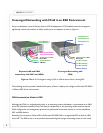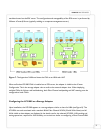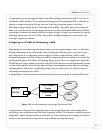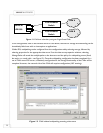
3
Introduction
Fibre Channel over Ethernet (FCoE) technology enables convergence of storage and LAN networks in
enterprise data centers. The key benefits of FCoE include cost savings and improved operating efficiencies,
but the technology is new and deployment configurations are less well understood than proven Fibre
Channel solutions.
Server virtualization using VMware ESX enables consolidation of server resources by allowing multiple
virtual machines to exist on a single physical server. This level of consolidation increases the demand for I/O
bandwidth and the need for multiple I/O adapters. FCoE-based converged networking addresses the
requirement for increased bandwidth while significantly simplifying the I/O infrastructure.
This deployment guide presents information about network convergence using FCoE technology and also
provides an overview of how to realize the maximum benefits from network convergence using FCoE
technology in an ESX Server environment.
Drivers of Network Convergence
Enterprises rely on their computing infrastructure to provide a broad array of services. As enterprises
continue to scale their computing infrastructure to meet the demand for these services, they inherently face
an infrastructure sprawl fueled by the proliferation of servers, networks and storage. This infrastructure
growth typically results in increased capital expenses for equipment and operating expenses for power,
cooling and IT management, reducing the overall efficiency of operations.
In order to overcome these limitations, the industry is moving towards empowering data centers with
technologies that enable consolidation. Server virtualization and blade server technologies are helping
address the consolidation of physical servers and rising rack densities in the data center. A related trend
associated with server virtualization and blade server deployments is the expanded use of higher I/O
bandwidth and adoption of external storage which enable consolidation and mobility.
Since the late 1990s data centers have maintained two sets of networks – a Fibre Channel storage area
network (SAN) for storage I/O traffic and a local area network (LAN) for data networking traffic. With the
growing implementation of SANs, accelerated by the adoption of blade servers and server virtualization, the
penetration of SANs is expected to grow much higher.
While IT managers can continue to maintain two separate networks, in reality this increases overall costs by
multiplying the number of adapters, cables, and switch ports required to connect every server directly with
supporting LANs and SANs. Further, the resulting network sprawl hinders the flexibility and manageability of
the data center.


















